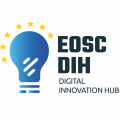This is a website for an H2020 project which concluded in 2019 and established the core elements of EOSC. The project's results now live further in www.eosc-portal.eu and www.egi.eu
This is a website for an H2020 project which concluded in 2019 and established the core elements of EOSC. The project's results now live further in www.eosc-portal.eu and www.egi.eu

Since its beginnings in 2018, EOSC-hub has aimed to create a hub of service providers to accelerate data-driven research in Europe - the Hub. It has succeeded and its results have provided input to the practical implementation aspects of the European Open Science Cloud (EOSC). In this final issue of the EOSC-hub Magazine, we take a look at EOSC-hub’s lasting legacy - its Nine Key Exploitable Results (KERs).
The EOSC Portal and Marketplace support the service discovery and access in EOSC. This KER includes technical components, intangible assets and contractual arrangements that make it possible to provide the service that facilitates the access and use of the EOSC assets. This also includes the rights to administer the IP addresses and IT infrastructure making accessing the EOSC Portal possible. Through this KER, it will be possible to operate a scalable and well-managed EOSC Portal and marketplace with a growing service portfolio and with a transparent governance model. The importance of the EOSC Portal as the primary, pan-European entry point to the EOSC ecosystem is going to grow dramatically as the scope of the EOSC services grows.
EOSC-hub defined and piloted an IT service management system (ITSM) for EOSC. This system will allow service providers to plan, deliver, operate and control services offered to customers or the future EOSC users. These activities are directed by policies and are structured and organised by processes and procedures. EOSC-hub implements best practices based on the lightweight standard, FitSM, regarding the service planning, delivery, operation and control of the services in the service catalogue. The SMS includes all services contributing to creation and delivery of the Hub. The Hub is a set of services essential to provide the core functionality for EOSC such as the helpdesk, monitoring, accounting, order management, among others.
To be able to create a market with providers and users, EOSC-hub developed a comprehensive and coherent set of rules and policies for service providers to onboard services and make them discoverable and accessible through the EOSC Portal. These rules of participation were piloted and put into practice in the operation of the EOSC Portal and have provided the discussions on the EOSC Rules of Participation with a practical way forward and a set of rules that have already been tested on prospective service providers. Through this result, the RoP brought forward by EOSC-hub makes it as easy as possible to bring new service providers into the EOSC ecosystem while still ensuring the quality and compliance of the overall services and building and maintaining the trust of the users and user communities.
The Internal Services provide the basic enabling services proposed for accessing and operating the EOSC. Some examples of these internal services include access control or accounting as well as common and standard interfaces to shared tools for basic services that need to be aligned in order to provide consistent user experiences. Internal services in the Hub Portfolio are one of the key elements foreseen for the EOSC federating core. This common toolset could enable the integration of services into the EOSC ecosystem. This is a prerequisite for the function of the Hub as a federating core, as a mature implementation of the tools that will help streamline the processes of the EOSC Hub Operators. For the service providers, this EOSC-hub result provides tools to access several user communities through the Hub by integrating their services into a single service interface (instead of several community-specific ones). The common services are targeting adoption by the permanent EOSC services and their importance will be increased by the growth of the number of users and the value delivered through EOSC. The reuse of individual components by third parties is also encouraged.
The EOSC is envisioned to provide a "one-stop-shop" for services and solutions to speed up the research process of the disciplines and enable cross-disciplinary collaboration and reuse of tools and results. To this end, EOSC-hub has gathered a number of diverse services in the EOSC Service Portfolio. Independently of the service characteristics, the EOSC Service Portfolio supports them by making the discovery of the services easier and reducing the effort needed to adopt them. Together with the EOSC Portal and Service Management System, this KER from EOSC-hub provides an intuitive, comprehensive and robust set of services to researchers. As the number of research activities and groups supported by EOSC grows, the possibility to easily search, request and re-use research services will become more and more important. Consistent metadata will be crucial for efficient service discovery (either by the researchers themselves or in collaboration with different helpdesk services). Providing an intuitive interface to the service lifecycle information will be of equal importance, especially when considering the long-term repeatability of EOSC-supported research. This KER provides the foundations for this functionality in the EOSC.
 EOSC Digital Innovation Hub (DIH): Platform for Industrial collaborations with EOSC
EOSC Digital Innovation Hub (DIH): Platform for Industrial collaborations with EOSCThe engagement of the private sector in the EOSC is a topic not commonly covered by many EOSC-related initiatives. Through EOSC-hub, the EOSC DIH provides a clear interface for commercial innovation that can be supported by EOSC as part of the broader European Digital Innovation Hub landscape (such as free access trials).
It is a multi-dimensional mechanism that allows research e-Infrastructures to support business organisations to stimulate innovation, as well as helping start-ups, SMEs, and other innovative actors to tap into the academic world both in accessing knowledge as well as technical services. The final goal is to create a one-stop-shop that brings IT services, research data, technology and expertise into a single place to support innovation in the industry. EOSC DIH offers several public-private collaboration models around piloting and co-design of new services (proof-of-concept work, performance testing, etc.), technical access to different “as a Service” resources (HPC/HTC/Cloud computing, storage, data management and higher-level services), training and support (Technical consultancy, service management, commercialisation) and visibility, using the DIH as a networking tool to expand beyond local markets.
EOSC DIH lowers initial investments (time and effort) for identifying and accessing services and developing or testing new products and services as well as increasing visibility and networking opportunities on a European level. Moving forward, it will be continued in the context of EOSC and the wider network of digital innovation hubs. In the long-run, it can provide a formalisation of the knowledge and expertise into procedure descriptions, standardised consulting offerings or certification schemes.
The Business and Sustainability models are crucial for long-term planning of EOSC. In addition to grounding the discussions about finances, they also provide foundations for ensuring the trust of users and user communities on the continued delivery of services. EOSC-hub provides a definition for the planned “EOSC Federating Core”, including a cost assessment and a business plan. The project also analysed a number of procurement and service delivery models that are applicable to different EOSC scenarios. The analysis will include considerations related to cross-border and -sectoral VAT compliance.
Clear and intuitive business models will increase flexibility, lower barriers of entry and reduce compliance costs in service provision and consumption by the EOSC stakeholders, and will thus be important inputs to EOSC sustainability planning. This result provided relevant input to EOSC policy bodies, in particular to the EOSC Sustainability Working Group.
Interoperability and Integration Guidelines piloted the definition of the high-level architecture for basic EOSC technical functions and promoting EOSC standards and APIs. The result, if implemented in the EOSC, will facilitate access to services, lower barriers to integrating and composing services and promote the usage of services between adjacent communities.
EOSC services that are ‘compliant’ with the interoperability and integration guidelines will offer well-established and documented interfaces for usage and integration, based on well-known standard or APIs, facilitating their exploitation from user communities willing to create new scientific services that could rely on well-established and documented interfaces for the integration. The combined usage of EOSC services, the adoption of well-known standards and interfaces will reduce the cost to integrate services.
As a consequence, less mature or small scientific communities can leverage on EOSC services, built on these guidelines, for a series of IT functions and focus on their scientific work, access to scientific services will be open to new communities through documented interfaces and new scientific workflows can be created combining existing applications.
The Training Courses and Material encompass a large variety of project results such as common and federated services for supporting the whole research life cycle, domain-specific training to target the needs of data providers and data scientists and advanced training on higher-level composable and PaaS services to consultancy building on training events aiming to stimulate the knowledge transfer, foster the use of digital infrastructures and promote the uptake of Open Science paradigm. The sound training programme delivered by EOSC-hub aimed to stimulate the establishment of a “knowledge network” of expertise and help researchers from different scientific disciplines to better integrate advanced digital services, tools and data to achieve excellence in science, research and innovation. Training services are tailored to optimally fit the requirements of the diverse audience EOSC needs to reach, ranging from service providers who might benefit from technical assistance on using, integrating and providing services in EOSC to individual researchers possibly encountering the e-Infrastructures for the first time, enabling a smooth integration into EOSC ecosystem and maximising the benefits.